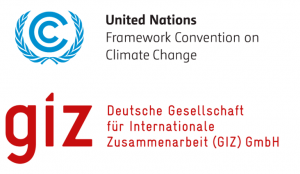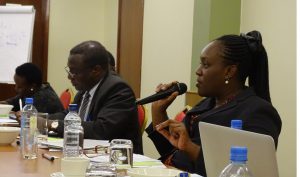UNFCCC and GIZ present: Webinar series on Methodologies for Baselines and Monitoring in the Transport Sector
We are pleased to invite you to participate in a joint webinar series of the UNFCCC Secretariat and GIZ on Methodologies for GHG Baselines and Monitoring in the Transport Sector. The series comprises eight webinars and is based on the chapters of the UNFCCC Secretariat’s Passenger and Freight Transport Volume of the Compendium on GHG Baselines and Monitoring.
 We’ll kick-start the series on 5 October 2017 at 2pm (UTC+2) German time with the first webinar on National Fuel Economy Standards. REPRESENTATIVES from the International Council on Clean Transportation (ICCT) will introduce a methodology and newly developed Excel tool (FESET) for setting GHG baselines and monitoring emission reductions from the introduction of fuel economy standards. In the last 30 minutes of the webinar, there will be time for questions and answers.
We’ll kick-start the series on 5 October 2017 at 2pm (UTC+2) German time with the first webinar on National Fuel Economy Standards. REPRESENTATIVES from the International Council on Clean Transportation (ICCT) will introduce a methodology and newly developed Excel tool (FESET) for setting GHG baselines and monitoring emission reductions from the introduction of fuel economy standards. In the last 30 minutes of the webinar, there will be time for questions and answers.
The webinar addresses primarily government agencies, consultants, think tanks and international cooperation organisations that want to calculate emissions reductions from fuel economy standards.
Webinar times – 5 October 2017
08:00 – 09:30 Washington DC (UTC-4)
09:00 – 10:30 Brasilia (UTC-3)
14:00 – 15:30 Berlin, Windhoek (UTC+2)
15:00 – 16:30 Addis Ababa, Nairobi (UTC+3)
19:00 – 20:30 Bangkok, Hanoi (UTC+7)
We’re looking forward to meeting you online!
The full series will cover the methodologies for all mitigation action types covered by the Passenger and Freight Transport Volume:
- National Fuel Economy Standards (5 October 2017 – with the ICCT)
- Comprehensive Urban Transport Programmes (13 December 2017 – with CCAP)
- Pricing Policies
- Alternative Fuels Incentives, Regulation and Production
- Mass Transit Investments
- Vehicle Efficiency Improvement Programmes
- Inter-Urban Rail Infrastructure
- Shift Mode of Freight Transport from Road to Rail or Water
Further information on the Passenger and Freight Transport Volume
On 09 May 2017, during the UNFCCC´s 46th session of the Subsidiary Bodies in Bonn, the publication of the Passenger and Freight Transport Volume of the UNFCCC’s Compendium on GHG Baselines and Monitoring was officially launched. The Transport Volume is a multi-stakeholder effort to provide a resource map of methodologies and tools for establishing baselines and monitoring emissions reductions from mitigation actions.It covers more than 30 methodologies and tools, which are structured into eight different mitigation action types.
The transport volume was coordinated by the Deutsche Gesellschaft für Internationale Zusammenarbeit (GIZ) in cooperation with the UNFCCC Secretariat and the Partnership on Sustainable Low Carbon Transport (SloCaT) and funded through the International Climate Initiative of the German Federal Ministry for Environment, Nature Conservation and Nuclear Safety BMU. It was written with the assistance of the Center for Clean Air Policy with contributions from the International Council on Clean Transportation (ICCT) and INFRAS.
 “Climate change was not a priority before TraCS…” said the head of the Roads Services Unit in the Ministry of Transport during the two and a half day “Data Requirements & Emissions Calculations for Decarbonising Transport” training held from October 11th to 13th 2017. He acknowledged the contribution the project has played in shifting the narrative and was looking forward to the sector playing a leading role in the next phase of implementation of the National Climate Change Action Plan (NCCAP). The training, which included representation from all key agencies within the ministry of transport, focused on two major issues: 1) introducing participants to the main approaches of emission calculation and mitigation option analysis for the transport sector, and 2) exploring the next immediate steps for the project. In the end it was agreed that TraCS, through the State Department of Transport and GIZ, will support revision of the National Climate Change Action Plan transport sections and will offer all necessary assistance including reviewing the mitigation potentials and further capacity enhancement for the engaged institutions. These revisions will be based on the agreed upon workplan provided by the Ministry of Environment and in close coordination with the overall revision process, also supported by the NDC Partnership.
“Climate change was not a priority before TraCS…” said the head of the Roads Services Unit in the Ministry of Transport during the two and a half day “Data Requirements & Emissions Calculations for Decarbonising Transport” training held from October 11th to 13th 2017. He acknowledged the contribution the project has played in shifting the narrative and was looking forward to the sector playing a leading role in the next phase of implementation of the National Climate Change Action Plan (NCCAP). The training, which included representation from all key agencies within the ministry of transport, focused on two major issues: 1) introducing participants to the main approaches of emission calculation and mitigation option analysis for the transport sector, and 2) exploring the next immediate steps for the project. In the end it was agreed that TraCS, through the State Department of Transport and GIZ, will support revision of the National Climate Change Action Plan transport sections and will offer all necessary assistance including reviewing the mitigation potentials and further capacity enhancement for the engaged institutions. These revisions will be based on the agreed upon workplan provided by the Ministry of Environment and in close coordination with the overall revision process, also supported by the NDC Partnership.
 GIZ kicks off its transport-focused events at COP23 in collaboration with the German Think Tank, Agora Verkehrsende, and the question: What is the level of ambition regarding mitigation of G20 countries in the transport sector?
GIZ kicks off its transport-focused events at COP23 in collaboration with the German Think Tank, Agora Verkehrsende, and the question: What is the level of ambition regarding mitigation of G20 countries in the transport sector? 
 GIZ is organising the one-day event, From Ambition to Action: Decarbonising Transport, to engage with the international community over the question of how to develop zero-emission transport systems to achieve the objectives of the Paris Agreement.
GIZ is organising the one-day event, From Ambition to Action: Decarbonising Transport, to engage with the international community over the question of how to develop zero-emission transport systems to achieve the objectives of the Paris Agreement. Join a roundtable discussion linkig global and local agendas in sustainable urban development. The speakers will discuss experiences and expertise that encompass urban development from all angles. Roundtable participants include representatives from French and German Ministries, Global Alliance for Buildings and Construction (GABC), MobiliseYourCity (MYC) and Cities Climate Financing Leadership Alliance (CCFLA).
Join a roundtable discussion linkig global and local agendas in sustainable urban development. The speakers will discuss experiences and expertise that encompass urban development from all angles. Roundtable participants include representatives from French and German Ministries, Global Alliance for Buildings and Construction (GABC), MobiliseYourCity (MYC) and Cities Climate Financing Leadership Alliance (CCFLA). 



